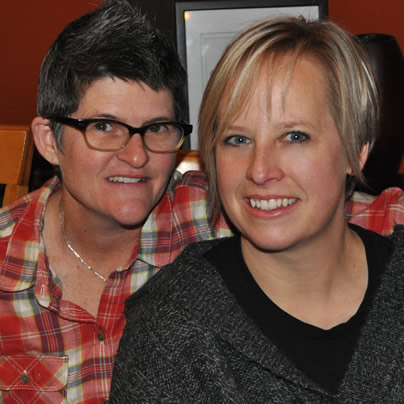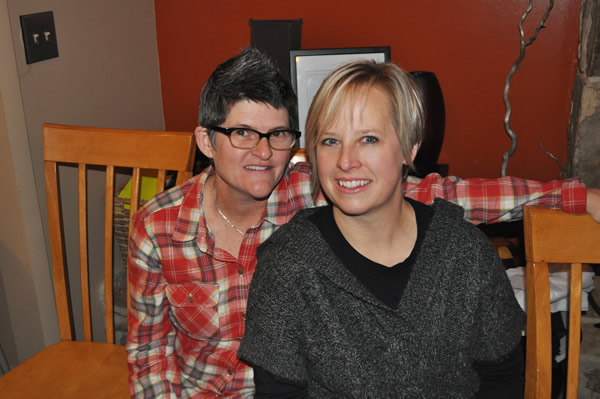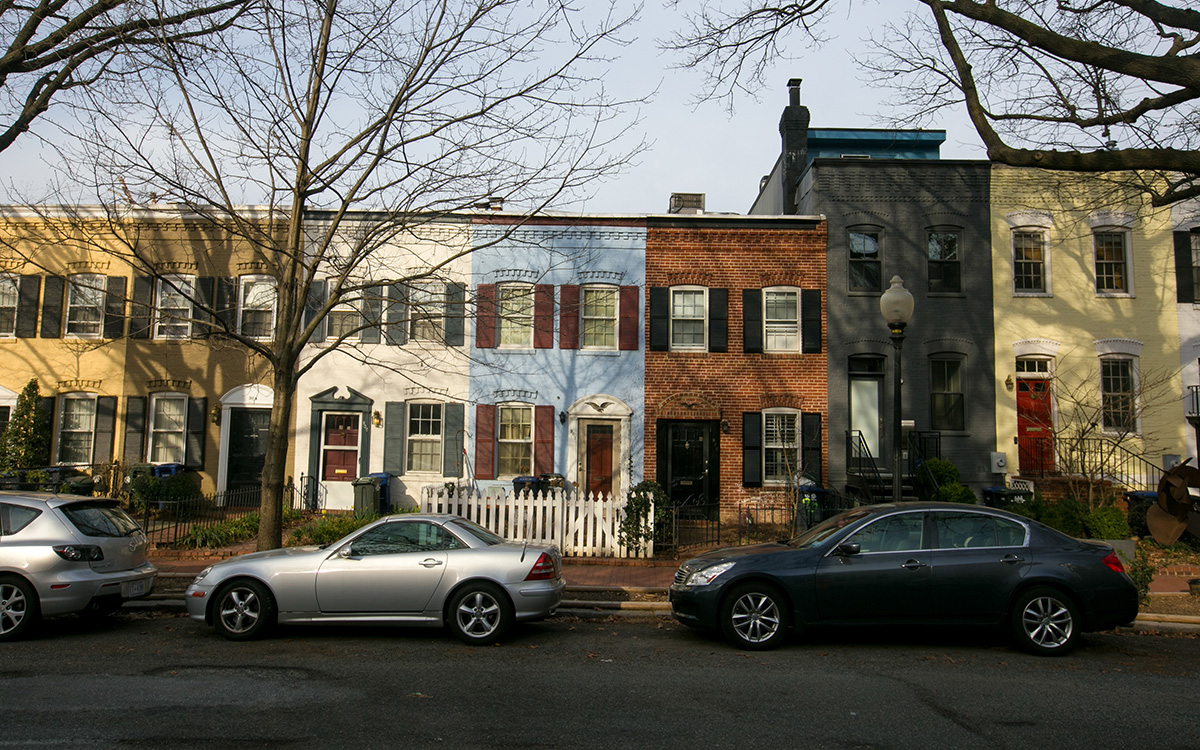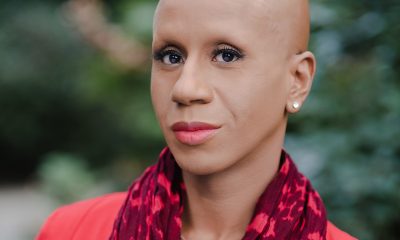Living
Coming to Washington
Showdown at the Supreme Court draws supporters, opponents from all over the U.S.


Amy Crampton and Tonya Agnew of Lafayette, Ind., plan to marry outside the U.S. Supreme Court on March 26. (Photo courtesy of Tonya Agnew)
Lafayette, Ind., residents Tonya Agnew and Amy Crampton plan to travel to Washington this weekend ahead of the U.S. Supreme Court’s oral arguments in the two cases that challenge the constitutionality of California’s Proposition 8 and the Defense of Marriage Act.
The couple’s 9-year-old son Leo is what Agnew describes as a “history buff.” But she and her partner of nearly 15 years have another thing on their agenda while in the nation’s capital.
“We thought it would be an amazing experience for him and for us to be part of history and see what’s happening and just be part of the vibe in town,” Agnew says. “Our next thought was kind of like, ‘Oh well we should totally get married while we’re there.’”
Agnew and Crampton plan to exchange vows at the Supreme Court on Tuesday against the backdrop of a rally in support of marriage rights for same-sex couples that is expected to draw thousands. Opponents of nuptials for gays and lesbians on the same day are scheduled to march to the court as the justices begin to hold oral arguments on the Prop 8 case.
Same-sex marriage supporters are expected to once again gather outside the court on Wednesday before oral arguments in the case that challenges DOMA.
“I’m cautiously optimistic,” Agnew says. “[I’m] really just mostly excited to be there and the fact that they’re even hearing them to begin with is just incredible.”
Marriage Equality USA Board President Cathy Marino-Thomas plans to travel from New York to D.C. on Monday with her wife Sheila, their 13-year-old daughter Jackie and other same-sex marriage advocates.
She was among those who spearheaded the years-long campaign for nuptials for gays and lesbians in New York that culminated in 2011 with Gov. Andrew Cuomo signing the same-sex marriage bill the state Senate narrowly approved into law.
Marino-Thomas says from her Manhattan office she has a “really, really positive feeling about this.”
“In the beginning it was just a small group of LGBT people who believed in the right to marry,” she says. “We graduated and more of our community believed in it. Then as time went on we started to gather straight supporters and then we started to gather politicians — Democrats, and the next step was we started to get some Republican support. Now we’re reading about the conservative argument for marriage equality and somebody like Ted Olson is leading the charge on one of the marriage cases. People are coming out for marriage left and right.”
Caleb-Michael Files, a junior at the University of Missouri-Kansas City, was in D.C. when the Supreme Court heard oral arguments in the case that challenged President Obama’s health care reform law. He was also here last June when the justices issued their 5-4 ruling that narrowly upheld it.
The Knob Noster, Mo., native, who says his family did not accept him growing up because of his sexual orientation, plans to return to D.C. in time for the oral arguments in the Prop 8 case.
“These are important milestones that we have to be present for and understand what’s going on,” Files says.
Rallies, vigils planned across the country
The two rallies outside the Supreme Court are among the more than 170 events scheduled to take place across the country to coincide with the oral arguments.
The School Without Walls GSA in D.C. will hold a candlelight vigil and rally in front of the Supreme Court on Monday. Retired New Hampshire Bishop V. Gene Robinson is among those scheduled to attend an inter-faith service at the Lutheran Church of the Reformation on Capitol Hill on Tuesday.
Other gatherings are scheduled to take place in Cumberland, Md.; Richmond, Va.; and Keyser, W.Va.
Up to 30 people are expected to attend a candlelight vigil on the beach in Gulfport, Miss., on Tuesday.
Leiana Wortel, who tried to apply for a marriage license with her partner and four other same-sex couples in Hattiesburg, Miss., in January as part of the Campaign for Southern Equality’s efforts to highlight the lack of marriage rights for gays and lesbians in the South, decided to organize the event after she learned about other gatherings around the upcoming oral arguments in the DOMA and Prop 8 cases.
“We just thought it would be nice to do something on the coast to get more of the local LGBT community involved and start some conversation here,” Wortel says.
An estimated 500 people are expected to attend a rally in support of marriage rights for same-sex couples at Federal Plaza in downtown Chicago on Monday.
Local LGBT rights advocate Richard Streetman expects the gathering could draw even more people if the Illinois House of Representatives this week approves a bill that would allow gays and lesbians to tie the knot in the state.
“Throughout the history of LGBT Americans, we have gathered in Washington, D.C., to petition our government,” he says. “There are times where that’s necessary. There are times when people should be working in their home communities.”
Advocates remain cautiously optimistic
Nine states and D.C. currently allow same-sex marriage.
A Rhode Island Senate committee on Thursday will hold a hearing on a bill that would allow gays and lesbians to marry in the Ocean State. Lawmakers in Delaware, Minnesota and New Jersey in the coming weeks and months are expected to consider measures that would extend marriage rights to same-sex couples.
Illinois Gov. Pat Quinn has said he will sign a same-sex marriage bill into law, but Streetman pointed out DOMA will remain on the books even if gays and lesbians can marry in the state.
“People in Illinois are excited,” he says about the outcome of the DOMA and Prop 8 cases. “Some people have unrealistic expectations of states giving us our state rights. It is almost symbolic until you deal with DOMA.”
Mississippi and Missouri are among the 31 states that have constitutionally banned same-sex marriage.
Wortel says a lot of people with whom she speaks “are optimistic” the justices will find Prop 8 and DOMA unconstitutional. She remains less hopeful about the prospect of nuptials for gays and lesbians in the Magnolia State.
“People are not as optimistic of what the outcome will necessarily be in Mississippi,” Wortel says.
Files notes questions over the future of Missouri’s constitutional ban on same-sex marriage if the justices strike down DOMA persist — Republicans control both chambers of the state Legislature, but a civil unions bill could be introduced once the Supreme Court rules on Prop 8 and DOMA.
“After the Affordable Health Care ruling, I think people are optimistic that there’s been a turning tide with the Supreme Court,” Files says. “These kinds of social and health care issues are issues we’re moving a little bit to the left on.”
Indiana lawmakers last month postponed a debate on a proposed constitutional amendment that would ban same-sex marriage until the outcome of the DOMA and Prop 8 cases is clear.
Agnew said she hopes they “really squash the current efforts underway” to amend the state constitution.
“That was exciting for us,” she says of the delayed debate in Indianapolis. “We’re hoping that it will be a positive outcome and will really trickle down to everyone — all of us out here in the Midwest and elsewhere.”
Real Estate
What property should I purchase if I’m not sure how long I’ll be in D.C.?
Row homes, English basements and more options abound

Great question! If you are looking at real estate as an investment – two great property types to look at would be a smaller row home and also a row home that has an English basement. Some property types that you might want to stay away from would be a condo or a co-op unit. Let’s take a look at why these properties would be good and bad:
Smaller Row Home
Row homes are a great investment for many reasons. You can often find smaller two-bedroom row homes in the same price point as those of a two-bedroom condo, which might be seen as a “condo alternative” and afford you much more freedom. There are no condo associations or home owner associations that you must belong to so this keeps your monthly carrying costs on the lower end and you are allowed to make more independent decisions. For example, if you wanted to paint the house purple – in most cases you would be allowed to. If you wanted to change the color of the front door or put shutters on the windows – you would be allowed to. This is usually not the case with condo or co-ops.
When it comes to the rental market – similarly renters like the independence of privacy in a home and not being among many other people. The luxury of perhaps direct off-street parking, outdoor space or even just more space at the same rental amount that a two bedroom condo rent would be – this is more appealing for a renter and would likely rent faster than that of a condo or co-op. For this model – you would obviously need to move out before you could take advantage of the investment of this type of real estate.
A row home with an English basement
With this type of real estate you can immediately begin receiving income after your purchase. You can occupy the upstairs of the row home, which is usually the larger portion of the home, or you could even occupy the basement, which is usually the 1-2 bedroom smaller portion of the home and receive rental income for the other half of the home. This can be in the way of a yearly traditional tenant or in the manner of short-term rentals (check with the most recent STR policies within the District). With this model, you stand to make even more of a return on your investment upon your move out of the home as you can rent the entire home or you can rent the top unit and basement unit independently to gross a larger amount of income. It is important to note that it is never advised to purchase a row home unless you can fully afford it WITHOUT the idea of accepting additional rental income to offset the mortgage cost.
These two options listed above are the most typical found within the District because they are fee simple, standalone pieces of real estate and are not within a condo association, HOA, or a co-op with governing documents that tell you what you can and cannot do which makes row homes an attractive type of real estate for a long-term hold.
When looking at types of properties that you might want to stay away from – condos and co-ops come to mind and I say this with a caveat. You can surely purchase these types of real estate but must first understand the in’s and out’s of their governing documents. Condos are bound by the governing condominium documents which will tell you for how long your lease must be, a minimum of lease days, you can only rent after you have lived in the residence for a number of years, likely will stipulate no transient housing – which means no short term rentals. It could also quite possibly say that you can only rent for a specific amount of time and lastly it will also stipulate that only a specific amount of people can rent at one time in order to stay below the regulated lending requirements set forth by Fannie and Freddie Mac. Similarly, Co-ops are even more strict – they can tell you that you are just not able to rent at all or if you can you can only do so for a specific number of years and then you are required to sell or return back to the unit as your primary residence.
As you can see, when it comes to condos and co-ops there are more specific and stringent bylaws that owners must agree to and follow that limit or even outlaw your ability to rent your piece of real estate. When you purchase a row home – there are no regulations on what you can and cannot do regarding rentals (outside of the short-term regulations within the District).
When looking for a piece of real estate in the District it is important to think through how long you could possibly wish to hold onto this property and what the future holds. If you think this is a long-term hold then you might consider a row home option – again, you can find a smaller two-bedroom row home that amounts to that price similar to a two-bedroom condo and would afford you a more flexible lifestyle. It’s important to work with a real estate agent to ensure that they guide you in this process and help answer any questions you might have. It’s also always advised to speak directly to a short-term rental specialist should you wish to go down that route as they will truly understand the in’s and out’s of that marketplace.
All in all, there are specific property types that work for everyone and within the District we have a plethora of options for everyone.
Justin Noble is a Realtor with Sotheby’s International Realty licensed in D.C., Maryland, and Delaware for your DMV and Delaware beach needs. Specializing in first-time homebuyers, development and new construction as well as estate sales, Justin provides white glove service at every price point. Reach him at 202-503-4243, [email protected] or BurnsandNoble.com.
Business
Heather Lawver’s journey to growth, inclusion with Ceemo.ai at StartOut’s Growth Lab
‘A program that embraces unique challenges LGBTQ+ founders have’

In the bustling world of startups, where innovation and diversity intertwine to forge new pathways, Heather Lawver, founder and CEO of D.C.-based Ceemo.ai stands out not just as a visionary entrepreneur but as a beacon of inclusivity and determination. Her journey to build Ceemo.ai, an advertising and branding platform dedicated to revolutionizing how startups conceive and market their brands, has reached a pivotal milestone with its selection into StartOut’s esteemed Growth Lab Accelerator, sponsored by J.P. Morgan.
With less than one percent of startup funding being allocated toward LGBTQ+ founders in 2023, according to a recent StartOut study, this five-month program is critical in providing resources and education to help LGBTQ+ entrepreneurs grow and compete.
Ceemo.ai joins eight other companies nationwide for this exclusive five-month training program.
A commitment to inclusion
Lawver founded Ceemo.ai in 2021 as a way to help entrepreneurs build better brands and seamlessly apply them to the marketing and pitch materials they need to launch the company of their dreams. The company’s simple five-step brand quiz helps founders think strategically about how they want to be perceived by their customers to then generate a full brand book with wordmark logo, color scheme, and font suite. Ceemo then applies that new brand book to a full suite of marketing and pitch materials, giving founders a roadmap to making sales and securing investment.
Her application to the Growth Lab Accelerator cohort was driven by more than the desire for business growth; it was fueled by her longstanding volunteer work with StartOut and a profound commitment to fostering an environment where LGBTQ+ founders are not only included but celebrated.
The selection of Ceemo.ai for StartOut’s Growth Lab, an accelerator known for its top-quality mentoring, education, and networking opportunities tailored for LGBTQ+ founders, marks a pivotal chapter in Lawver’s mission to help cultivate a more inclusive entrepreneurial landscape.
“Being in an accelerator where I’m not the only queer person in the room is not just empowering; it’s transformative,” she shares. “It means so much to be selected for a program that embraces the unique challenges LGBTQ+ founders have, and these issues are not just acknowledged but are central to the narrative of success and innovation.”
“The founders in our 2024 Cohort are problem solvers, developing unique products and solutions across a range of industries, from technology and software to food and beverage,” said David Barbee, Head of LGBTQ+ Initiatives, J.P. Morgan Commercial Banking. “As they continue to scale, these companies will need access to resources like capital and banking solutions, investors and business advisors. We are proud to provide mentorship and access to our firm-wide capabilities to help them reach the next level.”
“This platform is not just an accelerator; it’s a community where the unique challenges and triumphs of LGBTQ+ founders are acknowledged, celebrated, and used as a springboard for groundbreaking business success,” said Lawver.
Ambitious goals for bright future
Over the past decade, Lawver’s expertise in enhancing pitch decks and fundraising strategies has been instrumental in securing more than $170 million for minority entrepreneurs across various demographics, including women, BIPOC, LGBTQ+, disabled individuals, and seniors.
Her vision for her time in the five-month cohort is characterized by ambition and a keen focus on leveraging the program’s resources to scale Ceemo.ai’s impact. Her top goals include refining the platform’s Crunchbase algorithms to offer unparalleled market insights for startups, enhancing their organic sales funnels, and forging strategic partnerships with tech giants like Canva, Adobe, Google, Shopify, and Squarespace. These objectives are not just growth metrics but stepping stones towards revolutionizing how startups approach branding and marketing in a highly competitive digital landscape.
(Founded in 2009, StartOut, a national 501(c)(3) non-profit organization, is the largest national organization to support LGBTQ+ entrepreneurs with more than 28,000 members nationwide. Its mission is to accelerate the growth of the LGBTQ+ community to drive its economic empowerment, building a world where every LGBTQ+ entrepreneur has equal access to lead, succeed, and shape the workforce of the future.)
Real Estate
The rise of virtual home tours
Adapting to changing consumer preferences in spring real estate

In today’s dynamic real estate market, the spring season brings not only blooming flowers but also a surge of activity as buyers and sellers alike prepare to make their moves. However, in recent years, there’s been a notable shift in how consumers prefer to explore potential homes: the rise of virtual tours.
For the LGBTQ community, these virtual experiences offer more than just convenience; they provide accessibility, safety, and inclusivity in the home buying process.
Gone are the days of spending weekends driving from one open house to another – unless that’s your thing of course, only to find that the property doesn’t quite match expectations. With virtual tours, you can explore every corner of a home from the comfort of your own space – find something interesting? Schedule a showing with any LGBTQ Realtor at GayRealEstate.com.
This is particularly significant for LGBTQ individuals, who may face unique challenges or concerns when attending in-person showings. Whether it’s the ability to discreetly view properties without fear of discrimination or the convenience of touring homes located in LGBTQ-friendly neighborhoods across the country, virtual tours offer a sense of empowerment and control in the home buying process.
Moreover, virtual tours cater to the diverse needs of the LGBTQ community. For couples or families with busy schedules or those living in different cities or states, these digital walkthroughs provide a convenient way to view properties together without the need for extensive travel. Additionally, for individuals who may be exploring their gender identity or transitioning, virtual tours offer a low-pressure environment to explore potential living spaces without the added stress of in-person interactions.
At GayRealEstate.com, we understand the importance of adapting to changing consumer preferences and leveraging technology to better serve our community. That’s why our agents offer an extensive selection of virtual tours for LGBTQ individuals and allies alike – visit our website, choose an agent and within minutes you’ll have access to the Multiple Listing Service (MLS) via their website.
From cozy condominiums in bustling urban centers to sprawling estates in picturesque suburbs, virtual tours showcase a wide range of properties tailored to diverse tastes and lifestyles.
In addition to virtual tours, GayRealEstate.com provides comprehensive resources and support to guide LGBTQ buyers and sellers through every step of the real estate journey. Our network of LGBTQ-friendly agents is committed to providing personalized service, advocacy, and representation to ensure that all individuals feel respected, valued, and empowered throughout the process. Plus, we are happy to provide a free relocation kit to any city in the USA or Canada if you are a home buyer.
As we embrace the spring season and all the opportunities it brings in the real estate market, let’s also celebrate the power of virtual tours to revolutionize the way we find and experience our future homes. Whether you’re searching for your first apartment, forever home, or investment property, GayRealEstate.com is here to help you navigate the exciting world of real estate with confidence, pride, and inclusivity.
Jeff Hammerberg is founding CEO of Hammerberg & Associates, Inc. Reach him at [email protected].



















